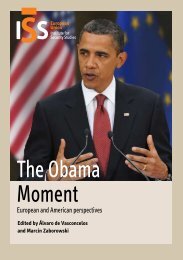Report - European Union Institute for Security Studies
Report - European Union Institute for Security Studies
Report - European Union Institute for Security Studies
You also want an ePaper? Increase the reach of your titles
YUMPU automatically turns print PDFs into web optimized ePapers that Google loves.
AGENDA<br />
Annex<br />
1. Background<br />
The end of the Cold War, and the associated disarmament process, has increased the<br />
importance of non proliferation of materials, technologies and weapons of mass destruction.<br />
Between 1992 and 2001, the US has committed on the order of 7 billion USD <strong>for</strong> its nonproliferation<br />
and threat reduction programmes, covering several areas of disarmament and<br />
non proliferation in Russia and other <strong>for</strong>mer Soviet states. Europe, both through projects of<br />
EU Member States or through <strong>European</strong> Community programmes, and Japan, have, over the<br />
same period, also initiated actions; nevertheless at a lower level of financial contribution.<br />
At the end of 1999, the <strong>European</strong> <strong>Union</strong> launched, in the frame of its Common Foreign and<br />
<strong>Security</strong> Policy, a Joint Action <strong>for</strong> non proliferation and disarmament of WMD in the Russian<br />
Federation. The main goal is to foster co-ordination at EU level and with other main players<br />
in the field. Two NDCI (Non proliferation and Disarmament Co-operation Initiative)<br />
Conferences, assembling governmental experts of 40 countries and 9 international<br />
organisations, have taken place in Brussels, in 2001 and 2002, to exchange in<strong>for</strong>mation on the<br />
scope and implementation of programmes.<br />
The dramatic events of the 11 September 2001 have added a new dimension to the threat<br />
associated with materials, technologies and weapons of mass destruction : the risk of<br />
diversion by non state actors. It has increased the focus and importance of the co-operative<br />
programmes fostering the securing and/or rapid elimination of weapons or materials.<br />
This resulted in the major initiative taken by the G8 Leaders in June 2002 at the Kananaskis<br />
Summit in Canada, called the G8 Global Partnership against the spread of weapons and<br />
materials of mass destruction. The raising of up to 20 billion USD, over the next ten years,<br />
has been committed by the Leaders, coupled with a set of non proliferation principles and<br />
guidelines <strong>for</strong> the effective implementation of programmes. The Evian Summit, in June 2003,<br />
took note of the progress, confirmed the importance to keep pace, drafted an Action Plan and<br />
started outreach activities to involve countries beyond the G8 into the endeavour.<br />
2. Purpose of the Conference<br />
While the topic is a priority subject of discussion within the US Government and the<br />
Congress, it has been, until very recently, less the case on the <strong>European</strong> side, in particular at<br />
the level of the EU Member States National Parliaments and the <strong>European</strong> Parliament. Cooperative<br />
threat reduction is nevertheless of vital importance <strong>for</strong> the security of our societies<br />
and there<strong>for</strong>e deserves awareness and attention by the Representatives of the People. Even<br />
more so today, since the topic of non proliferation of Weapons of Mass Destruction has<br />
recently received more attention by the <strong>European</strong> Council, as shown at the EU Council<br />
Meeting in Thessaloniki.<br />
This Conference is organised to in<strong>for</strong>m Members of Parliaments of the diverse bilateral and<br />
multilateral co-operative threat reduction programmes which are ongoing, most of them<br />
within the framework of the G8 Global Partnership against the spread of weapons and<br />
materials of mass destruction.<br />
The Conference should be the launch of a process whereby the Members of Parliaments<br />
would continue to be regularly in<strong>for</strong>med and further discuss the evolution of programmes, in<br />
order <strong>for</strong> them to play their roles in deciding, on an in<strong>for</strong>med basis, on budgets <strong>for</strong> further<br />
actions.<br />
2



